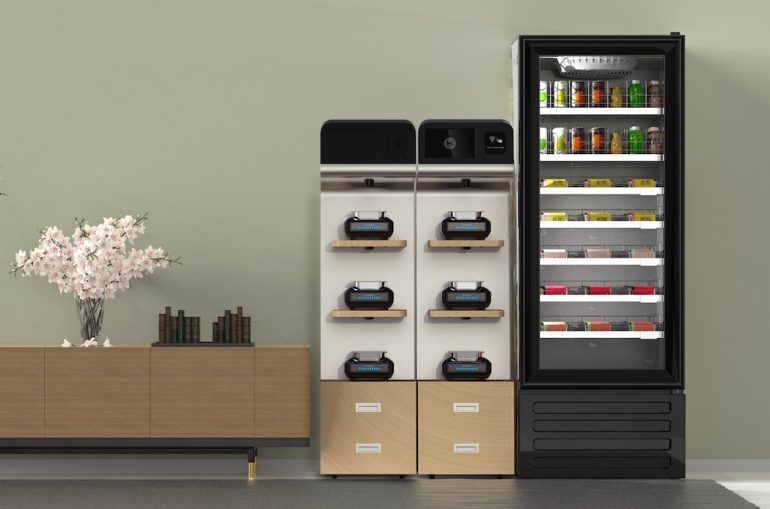Food has quietly played a big role at the office in recent decades. Reports indicate good food choices can boost morale, build culture, and improve health and wellness in the workplace. This is why Toronto-based KitchenMate targeted its smart cooking device specifically for office locations since the product launched in 2018.
“Offices need to accommodate higher safety requirements … and food service must be completely rethought as a result.”
But the role of the office is changing, and perhaps for good, thanks to the COVID-19 pandemic. New health and safety considerations are expected to impact every facet of workplace operations, including how organizations feed their employees.
KitchenMate CEO and founder Yang Yu realized that as the role of the office evolves, KitchenMate’s offering would need to evolve, too. Last month, the startup launched a new product, KitchenMate GEN2, to meet the unique demands of the post-pandemic workplace.
“As the world reopens, employees are looking for good reasons to work in the office again, and they also need to feel it’s safe to do so,” Yu told BetaKit. “Offices need to accommodate higher safety requirements, lower occupancy levels, and flexible workdays, and foodservice must be completely rethought as a result.”
Yu described the GEN2 product as an “Amazon Go in a box” that allows employees to select food and beverages from a cooler and use KitchenMate’s smart cooker to prepare hot meals. The food kiosk includes features to ensure health and safety guidelines are met, such as touchless payment and single-serve items, as well as a wider variety of food and beverage options compared to the first version of its product.
GEN2 also incorporates some novel technologies aimed to make the product more efficient and cost-effective. Some of these include aluminum induction for cooking, computer vision to make the kiosk theft-proof, predictive technology aimed to minimize waste, and food algorithms to create customized menus for different offices.
Yu said he believes KitchenMate GEN2 is a major step forward from the startup’s original product, which he described as a “Keurig for food,” allowing users to put a meal pod inside the startup’s cooking device to produce hot meals.
GEN1 was launched to the market in 2018, while KitchenMate was participating in Techstars’ Toronto accelerator program. Yu claimed that by February 2020, the GEN1 product had reached over 50 companies with a projected annual recurring revenue of over $1 million.
“It was a great time,” Yu said. “Everything was going up. And then, of course, COVID hit.”
Within two weeks of the virus reaching Canada, approximately 80 percent of KitchenMate’s office customers went remote and said they were not sure when they expected to return to a physical location. At this time, the startup was in the middle of a fundraise, which had to be put on pause until the summer of 2020.
RELATED: 77 percent of Canadian IT leaders say employees won’t return to office as normal after COVID-19
KitchenMate decided to focus on providing its GEN1 product to businesses that were deemed essential services and were permitted to keep their doors open. The smart cooker was deployed to five healthcare facilities in the Greater Toronto Area, including hospitals, to provide high-quality meals to boost the morale of frontline workers.
The startup managed to retain its staff through federal support programs such as the Canada Emergency Wage Subsidy and the Canada Emergency Rent Subsidy. KitchenMate’s employees, including executive leadership, also agreed to take a temporary salary cut during the pandemic (that reduction ended approximately three months ago).
Yu said as the pandemic continued, the KitchenMate team began to realize the limitations of the GEN1 in certain environments, such as warehouses, where employees need fast access to food with minimal waste. The company then began brainstorming how the product could be faster and more convenient while providing access to high-quality food. This led to the creation of GEN2.
Yu noted that before the pandemic, food at work traditionally involved catering, where a large quantity of food would be made available at the office. Now, because many organizations will return to work with an uncertain or limited number of employees in the office, he said catering is now either too expensive and planning-intensive.
In developing GEN2, KitchenMate also modified its food production model to reflect some of the broader trends that have emerged in the food supply chain during the pandemic. One of the most notable changes is the startup’s use of ghost kitchens.
Ghost kitchens are cooking facilities that operate without a storefront and only produce food for delivery or take-out. The popularity of these facilities rose in 2020 as the pandemic shuttered dining rooms across the country.
“The limitation of ghost kitchens, in the traditional sense, is that most meals are single-serve, and you need to produce them on the fly, which means labourers are not actually utilized to their fullest,” Yu noted.
The CEO said KitchenMate is hoping to make the ghost kitchen model more efficient and cost-effective by producing hundreds of servings of one meal at a single time and batch delivering the meals to food kiosks.
KitchenMate is currently allowing customers to reserve the GEN2 machines and is also working on forming a distribution partnership with a currently undisclosed office service provider. The startup will begin deployment in the Greater Toronto Area this fall and plans to expand across Canada in the next year.
The CEO said the evolution of KitchenMate’s offering was inevitable, adding that the pandemic only accelerated this move. Although Yu wants to eventually expand GEN2 beyond workplaces, he believes the product will be more relevant than ever in the post-pandemic office.
“KitchenMate’s primary audience is going to be the office post-COVID,” Yu said. “That’s how it was before [the GEN2], but now, the office is just going to be very different.”
Image source KitchenMate.

